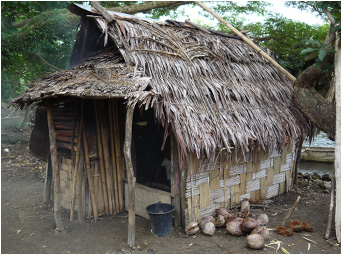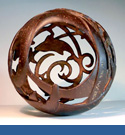
|
|
 |
Day 2,937 - Avokh Is., Vanuatu (16° 30S 167° 47E)
18:37hrs - June 15th 2015
Ni Vanuatu Kustom |

Vanuatu is unlike any other country we have visited in over eight years of cruising. We didn't sail here seeking dazzling, sun-drenched turquoise lagoons, decadent resorts, or peaceful days lazily exploring uninhabited postcard perfect islands. We did our homework. But nothing quite prepared us for the reality of exploring a rugged island chain and primeval culture that, unlike the well-trodden meticulously groomed 'traditional villages' on display for tourists in Tahiti, Tonga and Fiji, is very real.
This a harsh country. The islands not only lie in the middle of the South Pacific cyclone belt and can expect damage from an average of 2.5 cyclones a year, and devastation every ten, but they're also smack bang in the Pacific Ring of Fire and home to nine active volcanoes - seven belching fumes from the tops of islands and two bubbling deep below the ocean's surface. Dense jungle spills down craggy mountainsides to a coastline that is mostly exposed to wind and seas, and as there are no fringing reefs or protective lagoons, sailing between islands is far from tranquil. Tradewinds are frequently squeezed and accelerated between headlands, rip tides and currents build short, steep seas, and after just five hours, you'll arrive at your destination by day's end, salty and dishevelled, like you just came off a week's passage.
Almost all the villages we have visited over three weeks of cruising (we've visited six main islands: Efate, Shepherds, Epi, Malekula, Ambrym, Pentecost and Santo) exist off-the-grid with no electricity or running water. This is subsistence living in its purest form. Brackish water is drawn from hand-dug wells and used for cleaning and washing, rain water is collected for drinking. Fruits and vegetables are harvested on the main islands, fish are caught from outrigger canoes using lines, nets, or traditional bows and arrows, and cooked over wood-burning fires. Homes are loosely constructed from local wood, palms and thatch, floors are nothing more than firmly packed dirt.
But they are not poor. Poor suggests a level of desperation and hopelessness, the ni-Vanuatu are neither. They are a strong, proud and resourceful people who have survived here for over 3,000 years. But they do need help.
Cyclone Pam devastated much of the islands in March 2015 and the damage is extensive. We've donated our bags of nails and tools which we purchased in Port Vila, and also whatever else we can spare: cooking pots, a kettle, clothes, food, and rope. A paramount chief in the Shepherd Islands was so grateful for our supplies he waded out to our dinghy to personally carry them back to his village. Another chief, in the Maskelyne Islands, was thrilled when we donated our spare yankee sail to his village, which provided enough canvas to make four sails for outrigger canoes - a luxury item when many villagers literally use a leafy branch to catch the wind. To thank us we've received locally grown cucumbers, peppers, papaya, parsley, coconuts, aubergines and even a heavy, warm bundle of laplap (water taro) with snails, cooked by the chief's sister, wrapped in green leaves and delivered by outrigger to Dream Time.
To an overindulged western eye, life here would appear hopelessly desperate, but the ni-Vanuatu people seem genuinely happy. They live a simple life living off rich volcanic soils and heavy tropical downpours, in small villages and close communities. Sure, they may have very few personal possessions, but they have each other and a sense of tradition, and that could be their most valuable possession of all. |
|

| |

Save a dolphin!
Make an absentee bid on Dream Time's coconut sculpture! Learn more >
|
| |

Welcome Aboard!
Enertec Marine, has us all charged up find out why >
|

|





